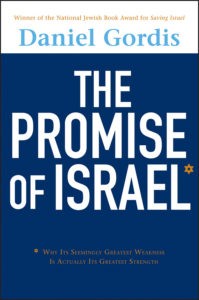 With just days to go until the release of his new book, “The Promise of Israel: Why It’s Seemingly Greatest Weakness is Actually Its Greatest Strength” (Wiley, Aug. 28, 2012 release; already available on the Kindle), Dr. Daniel Gordis took time from a busy schedule to answer a few questions and expand on the themes he presented in the book (which was reviewed on TC Jewfolk last week).
With just days to go until the release of his new book, “The Promise of Israel: Why It’s Seemingly Greatest Weakness is Actually Its Greatest Strength” (Wiley, Aug. 28, 2012 release; already available on the Kindle), Dr. Daniel Gordis took time from a busy schedule to answer a few questions and expand on the themes he presented in the book (which was reviewed on TC Jewfolk last week).
Gordis proposes that human beings live richer and more meaningful lives in the nation-state, where the majority of its citizens share a common history, language, culture, and sense of purpose. When coupled with democratic freedoms and protection of minority rights, such countries preserve both human diversity and freedom. He is adamant that minority rights in Israel be protected, yet he readily acknowledges that this has been a challenge. I asked him what steps Israel can take to better integrate its Arab minority, as well as what Arab-Israelis themselves can do to feel more fully a part of the country.
The discrimination that Arab-Israelis face at times must stop, Gordis states, and full access to jobs, education, health care and a decent civil society must be implemented. The task is made more complex because of Israel’s situation vis-a-vis the Palestinians, but that means that Israel must be doubly vigilant to safeguard the freedoms of its Arab citizens. Gordis is a strong proponent of National Service, which offers Arab Israelis an alternative to military service, puts them to work on projects that improve their own communities, and helps them to develop at a formative period.
National Service is a way that Arab-Israelis can demonstrate that they wish to step up and be part of the state.
Learning the Hebrew language and culture are essential too. Gordis notes with dismay that the Hebrew fluency common among older Arab Israelis has declined in the younger generation. He tells the story of hiring a middle-aged Arab carpenter for a home improvement project. All of the conversation about the project was done in Hebrew. When the carpenter returned for the installation, he brought along his son, who spoke no Hebrew at all. Not knowing the majority language is a big disadvantage for Arabs – “They will live better lives if they learn the language and culture,” says Gordis.
 We talked about the inevitable difficulties that Arab Israelis face in dealing with a national anthem, flag, and other symbols with which they are uncomfortable. “Symbols are tremendously important,” asserts Gordis, and while Arab comfort matters, maintaining the symbols that identify Israel as the Jewish state is essential. It requires some compromise on the part of Arabs, or as Gordis puts it, tolerating a certain amount of “cognitive dissonance.”
We talked about the inevitable difficulties that Arab Israelis face in dealing with a national anthem, flag, and other symbols with which they are uncomfortable. “Symbols are tremendously important,” asserts Gordis, and while Arab comfort matters, maintaining the symbols that identify Israel as the Jewish state is essential. It requires some compromise on the part of Arabs, or as Gordis puts it, tolerating a certain amount of “cognitive dissonance.”
The conversation turned to the relationship between diaspora Jews and Israel, specifically the distancing from Israel that is occurring between young Jews, even rabbinical students. How can young American Jews foster a greater sense of peoplehood? Gordis is well aware that the idea of peoplehood is going against the grain, that young people have been, in Gordis’ view “marinated in universalism”.
He proposes engaging in a new conversation that includes community leaders, rabbis young and older, all denominations and across the board. Peoplehood means not only acknowledging difference, but taking pride in it and valuing it. And it means having enough Jewish literacy to have “Jewish flavor with Jewish substance”. This problem won’t be solved overnight, says Gordis, but he hopes that this book and the ideas it presents will be a small step in the process.
One of the most compelling lines in the book was this: “It was in Zion that they (the early Zionists) believed that the greatest days of Jewish history were yet to unfold.” Such incredible optimism! Gordis also strikes me as an optimist, and so my last question was how he maintains his hopeful attitude.
He is realistic in assessing the many challenges that Israel faces, both internally and externally. And it is in turning toward our long history that he finds the perspective which enables him to stay upbeat. “If you consider where we were in 1946, we have no right for despondency” he states with conviction. “Judaism requires a historical perspective. Each generation is part of a continuum.” He cited examples of past Jewish division, passionate and significant. “We are not more divided today, but thanks to technology, we are more aware of each other.” Now is the time for “lacing up our boots” and plunging into the work that we need to do.
Gordis’ provocative ideas challenge us to think, rethink, and engage with each other in a substantive way- let the “new conversation” begin!
(Photo: the(?))

